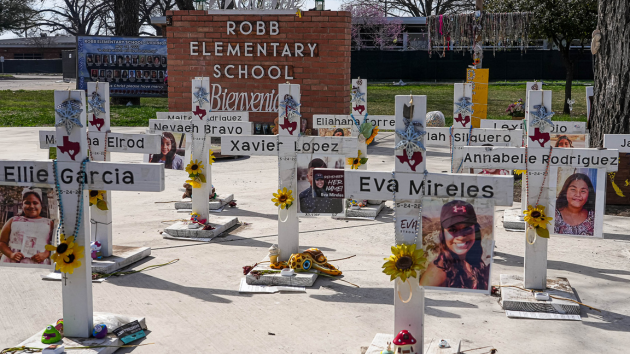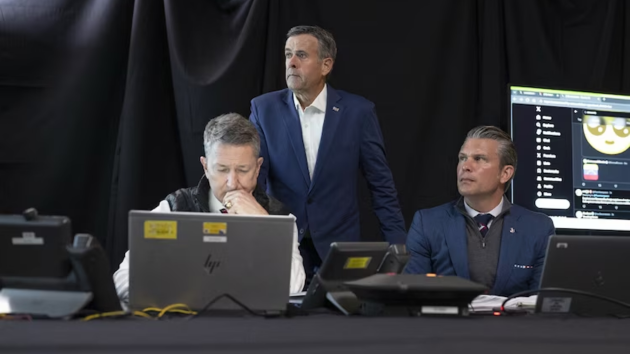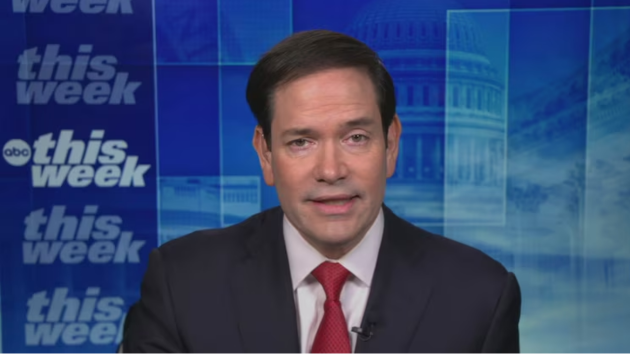What to know: Columbia University student protests against Israel-Gaza war continue
Written by ABC Audio ALL RIGHTS RESERVED on April 22, 2024

(NEW YORK) — Columbia University has been thrust into turmoil in the last week, reeling from a congressional hearing on antisemitism with President Nemat Shafik and NYPD’s arrest of more than 100 protesters in support of Palestinians on the university’s lawn.
Now, Columbia University’s classes are being held remotely due to the ongoing protests citing safety concerns and increased security on campus.
Here’s a timeline of the events as they continue to unfold:
Protests begin
On the morning of April 17, student protesters opposed to Israel’s war in Gaza have camped out throughout the Columbia University campus.
Columbia University Apartheid Divest, which states that it’s a coalition of more than 100 student groups, says it is calling for the university to financially divest from companies and institutions that “profit from Israeli apartheid, genocide and occupation in Palestine,” according to an online statement.
In March, the Columbia College Student Council approved a student referendum on the issue, according to the Columbia Daily Spectator.
“As a diverse group united by love and justice, we demand our voices be heard against the mass slaughter of Palestinians in Gaza,” the group stated.
Tensions have been high on college campuses nationwide since the start of the Israel-Hamas war on Oct. 7, when Hamas terrorists invaded Israel. The Israeli military then began its bombardment of the Gaza Strip.
In the Gaza Strip, at least 33,000 people have been killed and more than 76,000 others have been wounded by Israeli forces since Oct. 7, according to the Hamas-run Gaza Ministry of Health.
In Israel, at least 1,200 people have been killed and 6,900 others have been injured by Hamas and other Palestinian militants since Oct. 7, according to Israeli officials.
Multiple United Nations organizations have warned that Gaza is also experiencing “catastrophic” levels of hunger amid an ongoing humanitarian crisis.
Protesters camping on the university lawn say they believe the war in Gaza amounts to “genocide” of Palestinians.
“I’m here continuing the Jewish tradition of standing against oppression and injustice, especially as we approach Passover, a holiday that celebrates our own liberation and commits us to fighting for everyone else’s,” the Jewish Voices for Peace at Columbia said in an online statement.
The congressional testimony
On the same day as the protests, Columbia President Shafik testified before the House Committee on Education and the Workforce, which has been investigating antisemitism on college campuses. The hearing comes after two of Shafik’s counterparts at other elite colleges resigned amid a backlash over their responses at a previous hearing of the same panel.
In her opening statement, Shafik, who was appointed president of the Ivy League school in July 2023, told the committee that Columbia “strives to be a community free of discrimination and hate in all forms and we condemn the antisemitism that is so pervasive today.”
She said a “major challenge” has been reconciling free speech with the rights of Jewish students to go to school in an environment free of discrimination and harassment.
“Regrettably, the events of Oct. 7 brought to the fore an undercurrent of antisemitism that is a major challenge and, like many other universities, Columbia has seen a rise in antisemitic incidents,” Shafik said.
Shafik said she has taken actions since Oct. 7, including enhancing Columbia’s reporting channels, hiring staff to investigate complaints and forming an antisemitism task force.
Concerns from other student groups
Some other groups on Columbia’s campus, including Students Supporting Israel, say their needs for safety are not being met on campus.
The group described instances they say some Jewish, Israeli and Zionist students have faced, including intimidation and verbal attacks, saying the situation has become “untenable.”
“Students’ rights to peacefully attend their university courses without fear of being accosted or assaulted on their way to class were denied,” an online statement read.
An Arab-Israeli activist, Yoseph Haddad, was set to speak at the student group’s event on April 18 when he was allegedly punched by a protester just outside the campus. The event was canceled, the group said.
“It’s time we end this narrative and aim for a future where both Israelis and our Palestinian neighbors can accept each others’ fundamental right to live freely and without terrorism or war,” the group stated.
Student protesters have released a statement saying that “inflammatory individuals who do not represent us” have distracted from the group’s intentions.
“At universities across the nation, our movement is united in valuing every human life,” the statement from Columbia University Apartheid Divest continued.
The statement from Columbia University Apartheid Divest added that students have been misidentified, doxxed, arrested, locked out of campus housing and more, amid the protests.
“We have knowingly put ourselves in danger because we can no longer be complicit in Columbia funneling our tuition dollars and grant funding into companies that profit from death.”
Several university and local leaders have spoken out against instances of antisemitism amid the unrest.
“I have instructed the NYPD to investigate any violation of law that is reported,” New York City Mayor Eric Adams said. “Rest assured, the NYPD will not hesitate to arrest anyone who is found to be breaking the law.”
Arrests begin at Columbia
On April 18, one day after Shafik’s testimony, more than 100 protesters at Columbia University were arrested and an on-campus tent encampment was removed after the school’s president gave the New York Police Department the green light to clear the protesters, officials said.
“Students have the right to free speech but do not have the right to violate university policies and disrupt learning on campus,” Adams told reporters during a press briefing that evening.
Around 1:30 p.m. ET, police moved in and arrested dozens of pro-Palestinian protesters, placing their hands in zip ties and escorting them to buses. Other protesters chanted “Shame!” and “Let them go.”
Some 108 people were arrested for trespass without incident, officials said. Among those, two were also arrested for obstruction of governmental administration, officials said.
Isra Hirsi, the daughter of Rep. Ilhan Omar, D-Minn., was among those arrested for trespass and will be getting a summons, officials said. Hirsi said she was among several students suspended from Columbia’s Barnard College for participating in pro-Palestinian protests.
The terms of her suspension are unclear.
The tent encampment and protests have since resumed on campus in an ongoing, dayslong effort.
ABC News has reached out to Columbia University for comment.
Columbia cracks down
Columbia University announced Monday that all classes on Monday, April 22, would be held remotely and only essential personnel should report to work in person. She said campus tensions have been “exploited and amplified” by people unaffiliated with the university “who have come to campus to pursue their own agendas.”
“The decibel of our disagreements has only increased in recent days,” said Shafik. She said a group of administrators and faculty members will come together to come to a “resolution” on campus issues and also speak with student protesters. “We need a reset.”
A university public safety announcement on April 21 also outlined new resources to address “considerable disruption and distress” caused by ongoing gatherings at the campus, located in Manhattan’s Morningside Heights neighborhood.
The measures include increasing security patrol with 111 additional personnel — including more personnel for campus escort services and campus access point security — as well as improved ID checks at entry points and increased security at The Kraft Center, which houses aspects of Jewish life on campus, during the Passover holiday which begins on April 22.
NYPD told ABC News on Monday that there are no credible threats to any particular group or individual as a result of the protests at Columbia University.
The NYPD is working with the university to provide “safe corridors” for students — locations where officers will be stationed off-campus.
The department says it has not received any reports of physical harm toward any students.
Hochul comes to Columbia
New York Gov. Kathy Hochul said she met with the Columbia University president and NYPD officials early Monday morning to discuss public safety initiatives as student protests and unrest continue to play out on campus.
“Students are scared, they’re afraid to walk on campus, they don’t deserve that,” Hochul said in a video message posted to social media.
“I’m calling on everyone. People need to find their humanity, have the conversations, talk to each other, understand the different points of view. Because that’s what college students should be doing,” Hochul added.
ABC News’ Bill Hutchinson, Meredith Deliso and Ahmad Hemingway contributed to the report.
Copyright © 2024, ABC Audio. All rights reserved.
 KVSP
KVSP 




